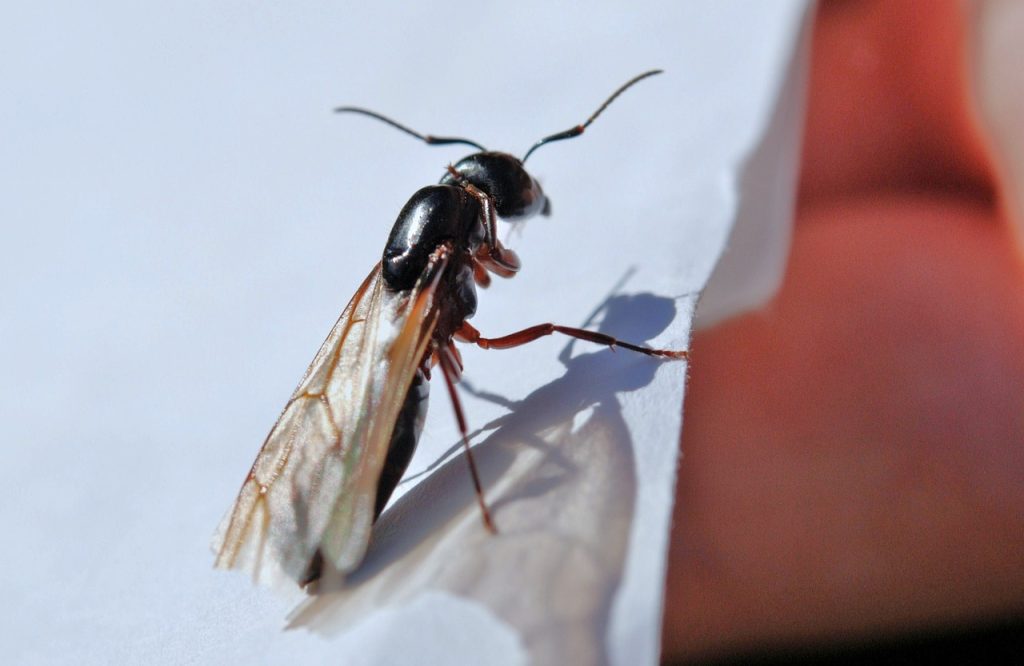Flying ants can be a nuisance when they swarm around your home and garden during the summer months. These winged ants are not a separate species but are simply reproductive ants that have left their colonies to mate and establish new colonies. While flying ants are generally harmless, their presence can be unsettling, and in large numbers, they can be difficult to control. In this blog post, we will discuss some effective ways that Sykes Pest Control use to prevent flying ants from entering your home and garden.
Seal Entry Points
One of the most effective ways to prevent flying ants from entering your home is to seal all entry points. Flying ants can easily enter through cracks in walls, doors, and windows, so it is essential to seal these gaps. Use silicone caulk or weather stripping to seal any gaps or cracks around doors and windows. Ensure that screens on windows and doors are in good condition and do not have any tears or holes.
Keep your home clean
Keeping your home clean and tidy is another effective way to prevent flying ants from entering your home. Ants are attracted to food sources, so make sure to clean up any spills or crumbs immediately. Keep your kitchen and dining areas clean and free of any food debris. Store your food in sealed containers and avoid leaving open containers of food on countertops. Regularly clean your garbage cans and make sure that they have tight-fitting lids.
Use ant repellents
There are many ant repellents available that can help keep flying ants away from your home and garden. One option is to use natural repellents such as vinegar, peppermint oil, or cinnamon. These natural repellents can be sprayed around doors and windows, or areas where ants are commonly seen. Another option is to use commercial ant repellents that are specifically designed to keep ants away. These repellents usually come in the form of sprays or granules that can be applied around the perimeter of your home and garden.
Trim trees and shrubs
Flying ants are attracted to trees and shrubs that are in close proximity to your home, so it is important to keep them trimmed. Trim any branches or shrubs that are touching your home or that are close to windows and doors. This will help prevent ants from using them as a bridge to enter your home.
Clean up water blockages
Flying ants are attracted to standing water, so it is important to eliminate any standing water around your home and garden. Make sure to regularly clean out gutters and remove any debris that may be blocking water flow. Fix any leaky pipes or faucets and make sure that your outdoor water sources are turned off when not in use.
Use insect screens
Insect screens are an effective way to prevent flying ants and other pests from entering your home. Make sure that all your doors and windows have insect screens in good condition. You can also install a mesh screen around outdoor dining or seating areas to keep flying ants away.
Call in professional pest control
If you have a severe flying ant infestation, it may be necessary to call in professional pest control. A professional pest control company can assess the severity of the infestation and recommend the best course of action. They may use a combination of methods such as baits, traps, and insecticides to control the infestation.
Use bait stations
Bait stations are another effective method to prevent flying ants from entering your home. These stations contain bait that is attractive to ants, and when the ants consume the bait, it slowly poisons them. Bait stations are easy to use and can be placed in areas where ants are commonly seen, such as near windows and doors.
Use sticky traps
Sticky traps can be an effective way to control flying ants in your home. These traps use a sticky substance to trap the ants when they land on them. You can place these traps near doors and windows or other areas where ants are commonly seen. Sticky traps are easy to use and can be disposed of once they are full.
Keep outdoor lights off
Flying ants are attracted to light, so it is important to keep outdoor lights off as much as possible. This will help prevent them from congregating around your home and garden. If you need to have outdoor lighting, use yellow or red lights, which are less attractive to flying ants.
Use a dehumidifier
Damp areas are prone to flying ant infestations, so it is important to keep your home dry. Use a dehumidifier to remove excess moisture from the air, especially in areas like basements and bathrooms. This will help prevent flying ants from entering your home.
Remove dead wood and debris
Wood and debris is another element that flying ants are attracted to, so it is important to remove these from your home and garden. Clear any dead wood or debris from your yard and remove any logs or stumps that may be in your yard. This will help prevent flying ants from using them as nesting sites.
Conclusion
In conclusion, preventing flying ants from entering your home and garden requires a multi-faceted approach that includes sealing entry points, keeping your home clean, using ant repellents, trimming trees and shrubs, cleaning up standing water, using insect screens, calling in professional pest control, using bait stations, using sticky traps, keeping outdoor lights off, using a dehumidifier, and removing dead wood and debris. By taking these measures, you can effectively prevent flying ants from becoming a problem in your home and enjoy a pest-free summer season.
Contact
If you’re experiencing a flying ant infestation, our pest control experts are here to help.
To get in touch with us, simply fill out the contact form on our contact page or give us a call on: 07796 615 260.

